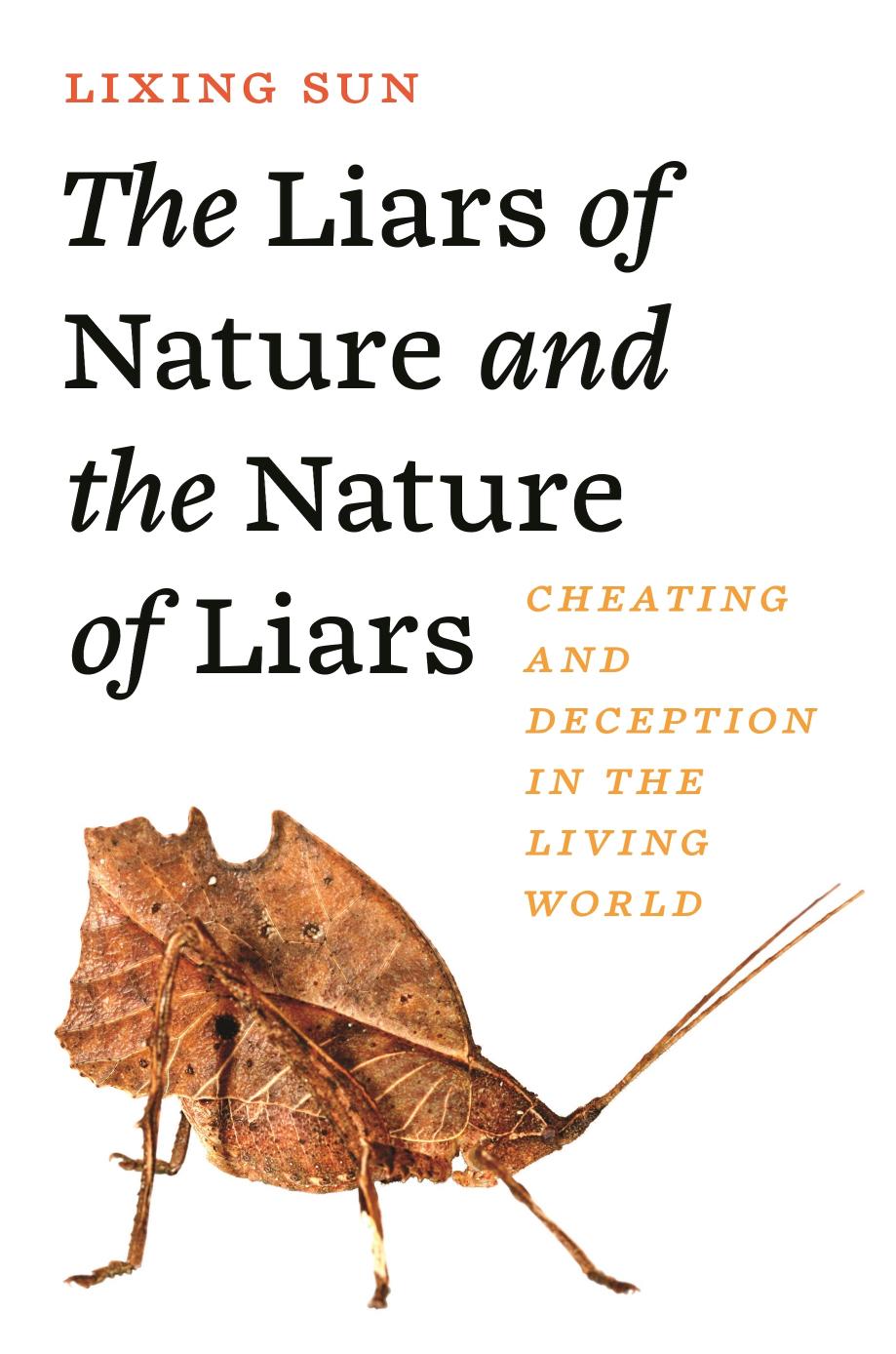The Liars of Nature and the Nature of Liars: Cheating and Deception in the Living World by Lixing Sun

Author:Lixing Sun [Sun, Lixing]
Language: eng
Format: epub, pdf
ISBN: 9780691198606
Google: LqiTEAAAQBAJ
Barnesnoble:
Goodreads: 61282573
Published: 2022-12-01T09:05:15+00:00
chapter 7
Liars Who Lie to
Themselves
When you know a thing, to hold that you know it; and when you do
not know a thing, to allow that you do not know itâ this is knowledge.
â confucius
The meaning of the phrase âKnow Thyself,â inscribed in the Temple of
Apollo at Delphi, has inspired a spirited debate among classics scholars.1
But the true import of this ancient dictum had not been broadly appreci-
ated in Amer ica until the founding of the Minnesota town of Lake Wobe-
gon in 1974. Despite a small population of 900 people, the town was special
because âthe women were strong and the men good- looking and the
children all above average,â as told by Garrison Keillor.
Keillor confessed in 2014 that he in ven ted the town and its inhabitants
for the âNews from Lake Wobegonâ segment of his radio program, A
Prairie Home Companion, aired on hundreds of public radio stations. For
42 years, from 1974 to 2016, mil ions laughed heartily at the stories from
Lake Wobegon, where people often think they are better than they
really are and do foolish things beyond their capabilities.
Although a comedian, Keillor wasnât really joking. People in most
towns arenât so dif fer ent from those in Lake Wobegon. The above-
average effect, known as illusory superiority in psy chol ogy, can be
159
160 ch a p t e r 7
found in all aspects of our lives. Thatâs why the show was popu lar for
de cades. In fact, the fictional stories Keillor told felt so au then tic that many
in his audience believed Lake Wobegon was real. Apparently, many of
us have little appreciation for the limits of our own knowledge and abili-
ties. Instead, weâre inclined to overestimate both. That is, we cheat on
ourselves.
The prevalence of self- deception is truly staggering. In regard to our
personal health, for example, most people believe they live a healthier
lifestyle and have a longer lifespan than their peers.2 Over 90% of people
believe they are better- than- average drivers.3 In social skil s, 70% of high
school students consider themselves above average in leadership, and
25% blatantly put themselves in the top 1%.4 Likewise, most people ex-
aggerate their popularity and inflate the number of their friends.5 In aca-
demic and job per for mance, 87% of students rate themselves better than
their average peers, and over 90% of faculty members place themselves
in the top half in teaching ability.6 The same can be said for lawyers who
think they can win a case or for stock traders who consider themselves
to be the best in the business.7
Under the spell of self- deception, people overstate their incomes,
attractiveness, happiness, technical skil s, biological endowments, and
moral character. They often unwittingly brag, selectively presenting only
the good side of themselves in school, at work, and online. How many
of your Facebook friends, for instance, post pictures or video clips about
the downside of their livesâ such as being demoted, having financial
trou bles, or getting dumped in a relationship?
Self- deception often compels us to attribute successes to our own
effort, skil s, or intel igence, but we excuse our failures as due to external
causes or prob lems on the part of others.
Download
The Liars of Nature and the Nature of Liars: Cheating and Deception in the Living World by Lixing Sun.pdf
This site does not store any files on its server. We only index and link to content provided by other sites. Please contact the content providers to delete copyright contents if any and email us, we'll remove relevant links or contents immediately.
| Amphibians | Animal Behavior & Communication |
| Animal Psychology | Ichthyology |
| Invertebrates | Mammals |
| Ornithology | Primatology |
| Reptiles |
Sapiens: A Brief History of Humankind by Yuval Noah Harari(14371)
The Tidewater Tales by John Barth(12653)
Mastermind: How to Think Like Sherlock Holmes by Maria Konnikova(7324)
Do No Harm Stories of Life, Death and Brain Surgery by Henry Marsh(6938)
The Thirst by Nesbo Jo(6932)
Why We Sleep: Unlocking the Power of Sleep and Dreams by Matthew Walker(6706)
Life 3.0: Being Human in the Age of Artificial Intelligence by Tegmark Max(5549)
Sapiens by Yuval Noah Harari(5366)
The Body: A Guide for Occupants by Bill Bryson(5082)
The Longevity Diet by Valter Longo(5058)
The Rules Do Not Apply by Ariel Levy(4957)
The Immortal Life of Henrietta Lacks by Rebecca Skloot(4581)
Animal Frequency by Melissa Alvarez(4463)
Why We Sleep by Matthew Walker(4435)
The Hacking of the American Mind by Robert H. Lustig(4375)
Yoga Anatomy by Kaminoff Leslie(4359)
All Creatures Great and Small by James Herriot(4311)
Double Down (Diary of a Wimpy Kid Book 11) by Jeff Kinney(4261)
Embedded Programming with Modern C++ Cookbook by Igor Viarheichyk(4173)
